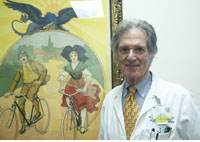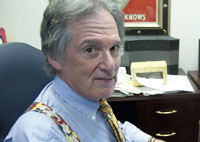Gaining Human Insight Via A Book Club

Posted in GUMC Stories
 Few doctors in the middle of a fellowship make time to read any book besides a textbook. Which is why Bruce Cheson, M.D., suggests they set aside their usual reading material and join his new “book club.”
Few doctors in the middle of a fellowship make time to read any book besides a textbook. Which is why Bruce Cheson, M.D., suggests they set aside their usual reading material and join his new “book club.”
Cheson held his inaugural book club meeting in February, which was a deliberate and expanded mutation of the traditional journal club he usually held with the cancer fellows. He began this endeavor in his new role as Deputy Chief of the Division of Hematology/Oncology at Georgetown Lombardi Comprehensive Cancer Center, and mentor to junior and mid-level faculty, in addition to the cancer fellows.
So far, Cheson has chosen to read and discuss non-fiction books about cancer ⎯ the disease that he and his book club members research and treat. The first selection was The Emperor of All Maladies, the Pulitzer Prize-winning book by Siddhartha Mukherjee that tells the history of cancer. Next on the list is The Immortal Life of Henrietta Lacks, by Rebecca Skloot, which traces the human story behind the birth of the HeLa cells that have been widely used in laboratory research of cancer and a number of other disorders.
As far as Cheson knows, he is the only physician in his role at an academic medical center that has started a book club like this. “I am told this is unique,” he says, rather dryly.
The quarterly book club sessions are open to individuals at Georgetown’s Division of Hematology/Oncology, and include the wine and cheese that is de rigueur at book clubs around the globe.
History and Insight
“Those who research cancer or offer cancer care need to know where the field has come from so they know where it can go, how to get there, and the obstacles involved,” Cheson says. “I hope the fellows ⎯ as well as all the book club members ⎯ gain new insights into the human side of hematology-oncology, not just the factual information that is required they learn. I also want them to have fun in doing it.”
Such pleasure involves not only learning something new, but exercising the right to be a critic.
One fellow disliked the author of The Emperor of All Maladies after he did some research, and many thought the book had too much melodrama in it, but virtually all participants at the inaugural book club meeting, which included not only the fellows, but another faculty member and three nurses, enjoyed the discussions, Cheson says.
“The book club members were impressed by a number of things, such as the fact that there really was a history to what they were practicing now. They never knew where things came from, and now they had some idea of the process that led from not knowing what to do with breast cancer to the concept of adjuvant therapy,” Cheson said in his recent article on the book club published online in Medscape Hematology.
Valuable Perspective
 Cheson says he performs several roles in the book club⎯ acting as organizer, book selector, facilitator, and “source of perspective ⎯ historical, personal, and otherwise.”
Cheson says he performs several roles in the book club⎯ acting as organizer, book selector, facilitator, and “source of perspective ⎯ historical, personal, and otherwise.”
The book club members “really enjoyed learning about the history, and that cancer was actually made into something more tangible, an object that could be attacked; that there were people who were not affected directly by cancer but who really rallied around the cause,” Cheson says. “They were mostly impressed by the fact that it has been 40 years now since Nixon said ‘we are going to cure cancer,’ and we are still quite a way off.”
In the inaugural meeting, the book club members were asked to pick specific characters in the The Emperor of All Maladies that they most liked. The answers ranged from Dennis Slamon, M.D., who was determined to get drug companies to help develop trastuzumab (a breast cancer drug also known as Herceptin) to William Halsted, M.D., the surgeon who introduced radical mastectomy for breast cancer.
The fellows were captivated by the “more is better” idea that defined cancer care for a time, Cheson explains. As an example, surgeons took off as much breast tissue, clavicle, muscle, skin as they could, “leaving these poor women disfigured, and still the disease came back,” he says.
“They also couldn’t believe that people did transplants in breast cancer. I had to keep introducing my own personal involvement in this and how I was opposed to what we now would think of as madness.”
Cheson will continue writing about his quarterly meetings of his book club for the publication Medscape Hematology, hoping that other readers might join along in spirit. “We all need to take time to think beyond what we do in our everyday jobs, and developing new perspectives on our field is very rewarding.”
His “novel” idea seems to have already spun-off a new book club. Antonio Tito Fojo, M.D., Ph.D., Head of Experimental Therapeutics Section at the National Cancer Institute, wrote Cheson (his old friend) an email after reading about the book club in Medscape Hematology. “Only Bruce Cheson would start a book club!” Fojo wrote. “And you know what, it was very enjoyable to read/watch. I’ve decided to do the same with our fellows. I thought this is a great idea!”
By Renee Twombly, GUMC Communications
(Published March 16, 2012)
